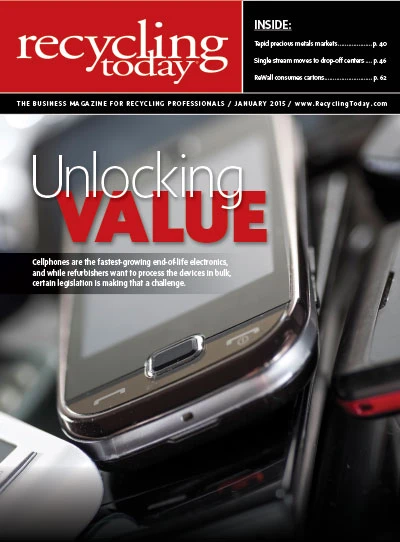 In the waste and recycling industry, our first concern is that all workers safely come home to their families each day. Yet, often times, collection workers’ lives are put in peril as impatient motorists drive unsafely around garbage trucks.
In the waste and recycling industry, our first concern is that all workers safely come home to their families each day. Yet, often times, collection workers’ lives are put in peril as impatient motorists drive unsafely around garbage trucks.
More than a decade ago, Larry Stone, then with Rumpke Consolidated Cos., Cincinnati, with support from McNeilus Cos., created the “Slow Down to Get Around” program to encourage motorists to drive safely and slowly around trucks collecting neighborhood trash and recycling. A few years later, the National Waste & Recycling Association’s (NWRA’s) predecessor, the National Solid Wastes Management Association, adopted the program (https://wasterecycling.org/slowdown) and partnered with the Occupational Safety and Health Administration (OSHA) to make a Slow Down to Get Around public service announcement video, available at www.youtube.com/watch?v=QNZT8sMmgwg.
But it hasn’t proven enough. Bureau of Labor Statistics numbers tell us that waste collection employees, including recycling workers, remain vulnerable to being struck by motorists.
“We had to do something,” says Sharon Kneiss, president and CEO of NWRA. “When you look at the numbers, it becomes clear that additional measures are needed to ensure the motoring public drives with caution around workers to protect their safety,” she adds.
Thus was born the initiative to take the Slow Down to Get Around approach to the state legislatures and create laws to require that motorists treat recycling and garbage trucks as they would emergency vehicles—slowing down and leaving plenty of room.
As of the end of 2014, such laws have been passed in five states: Michigan, Alabama, Wisconsin, West Virginia and Florida. More are ahead. Here’s a look at what’s been accomplished so far.
Michigan
Michigan was the first state to pass Slow Down to Get Around legislation in 2009. The state’s law requires drivers to treat garbage trucks as if they are law enforcement vehicles. Motorists must slow down and drive cautiously around these stopped vehicles. The law allows felony charges against any motorist who injures or kills anyone working on or around garbage trucks.
Houston-based Waste Management, the nation’s largest waste company, was a major supporter of the bill and was able to cite example after example where its employees were put in danger.
“In some instances, our waste hauling and recycling trucks have been rear-ended because the driver was talking on a cellphone or texting and didn't realize there was a stopped vehicle right in front of them,” says Waste Management’s Tom Horton.
Alabama
In 2013 Alabama’s legislature passed a law championed by State Rep. Mac McCutcheon (R – Monrovia), who revealed that he sponsored the bill after speaking with his constituents about the need to protect workers on garbage trucks.
The Move Over law requires drivers to vacate the lane closest to the collection vehicle. On a two-lane road, they should move as far away from the collection vehicle as possible within the lane. Drivers also should slow down to at least 15 mph less than the posted speed limit.
Wisconsin
The second 2013 victory was inspired by tragedy in Wisconsin. State Rep. John Jagler (R – Watertown) and State Sen. Paul Farrow (R – Pewaukee) pushed for reforms after a reckless driver seriously injured Mark Friend, a sanitation worker from Ixonia, Wisconsin.
Friend, who is married and the father of two young boys, was pinned between two vehicles and lost his leg after a motorist passed his garbage truck without slowing down. He was in a coma for two weeks and spent an additional two months recovering in the hospital. Friend is now an advocate for road safety and joined Gov. Scott Walker at the official signing of the legislation.
The bill doubled the fines for reckless driving and certain speeding violations, with specific provisions for violations committed near sanitation vehicles.
West Virginia
It took another tragedy to pass the Slow Down to Get Around law in West Virginia.
 Jeremy Tabler, 30, was fatally struck by a vehicle in March 2013 while exiting the driver’s side door of a stopped sanitation truck. The driver of the vehicle that hit him was not speeding and was cleared of charges because there were no laws regarding driving near or passing stopped waste service vehicles.
Jeremy Tabler, 30, was fatally struck by a vehicle in March 2013 while exiting the driver’s side door of a stopped sanitation truck. The driver of the vehicle that hit him was not speeding and was cleared of charges because there were no laws regarding driving near or passing stopped waste service vehicles.
Now the “Slow Down to Get Around Bill,” authored by State Sen. Donald Cookman (D – Hampshire) and signed into law last spring, requires West Virginia drivers to slow down to 15 mph when passing a stopped sanitation truck.
“The person that was driving by did not slow down,” Jeremy Tabler’s widow, Tiffany Tabler, told the Martinsburg (West Virginia) Journal News at the time. “There are laws to protect police officers and (officials) like that, but there isn’t anything protecting the waste truck drivers,” she continues. “If my husband were struck (by a vehicle) going 15 mph versus 45, then he probably would still be here today.”
Florida
In Florida, a transportation bill sponsored by Rep. Frank Artiles (R – Miami) added vehicles to the “Move Over Act.” It was signed into law in June 2014.
Under the law, when a motorist approaches service vehicles—tow trucks, utility trucks or, now, sanitation vehicles—he or she must move over one lane. When changing lanes is unsafe or the driver is traveling on a two-lane road, the driver must slow to 20 mph less than the posted speed limit, or to 5 mph when the speed limit is 20 mph or less.
“I want to thank the Florida Legislature for adding sanitation vehicles to the Move Over Act … and the leadership of Rep. Daniel Davis (R – Jacksonville), chair of the House Transportation & Highway Safety Subcommittee, which allowed this legislation to pass this session,” says Chuck Dees, NWRA Florida Chapter chair and vice president of public affairs for Waste Management of Florida.
NWRA would later name Davis its Florida Legislator of the Year for 2014.
Going Forward
NWRA and its chapters will once again make Slow Down to Get Around one of their top legislative priorities in state sessions for 2015.
“We owe it to the families of folks like Jeremy Tabler and Mark Friend to continue this work,” Kneiss says. “We will tell their stories to any who will listen. No child should lose their mother or father because someone was anxious to get to work.”
Craig Branson is the communications manager for the National Waste & Recycling Association, Washington. He can be reached at cbranson@wasterecycling.org.
Recycling Today readers who would like to help NWRA pass Slow Down to Get Around laws in their states should contact David Biderman at 202-364-3743 or at davidb@wasterecycling.org.
More information on NWRA’s Slow Down to Get Around initiative is available at http://wasterecycling.org/slowdown. To share this information with customers, direct them to http://beginwiththebin.org/slowdown.

Explore the January 2015 Issue
Check out more from this issue and find your next story to read.
Latest from Recycling Today
- Hyundai says it will make steel in the US
- APR announces Recycling Leadership Award winners
- Glass Half Full opens glass recycling facility in Louisiana
- AmpUp partners with Roundtrip EV
- Global Recycling Day event supports Pittsburgh school's recycling efforts
- President signs executive order on critical minerals
- Registration opens for Scrap Expo 2025
- Toyota opens ‘circular factory’ in UK






